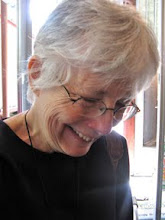I'm reading a book called 36-Hour Day. Called "the definitive guide to Alzheimer's", it should probably be required reading for all baby-boomers, and their children who will end up watching them deteriorate. It's actually fascinating reading... not only because it helps me understand the odd behaviors of my aging sisters, but also because I recognize myself in the early stages of this process, even though I still function on a reasonably high level. I forget things now. I have to use spellcheck more often. It takes me longer to learn a new task, and I do things on my computer the way I've always done them, not because I can't learn new key commands, but because there's a certain satisfaction in going up to the menu and clicking "save".
I still say Alzheimer's, even though the official designation is Alzheimer Disease (without the 's). I learned Alzheimer's. It would take a lot of energy to learn it without the 's.
There's a cultural more in religious communities that explains why we do certain things the way we do: Because we've always done it that way. It confounds new sisters testing their vocations. They think it's a joke. But it is and it isn't. They cannot understand the stubbornness with which the community expects certain duties and tasks to be performed, certain rituals to be observed.
When this culture clash occurs (and it always does in some form or another) the new recruit will respond in a number of different ways: She gets angry. She argues that there is a better way. She argues that it doesn't matter. She tries to change the community's perception of how it should be done. She does it her own way in spite of the conflict. She does it the community's way but resents the hell out of it. She learns the value of doing it the way we've always done it.
Getting to that final stage... acceptance is one of the necessary steps in a sister's vocational test. Her ego must surrender to the community's established way of life. Many cannot make the leap. It's just too counter-intuitive for a normal 21st-century-conditioned woman.
With our elders, we see them less distracted and upset when they can continue to do things the way they've always done them. There's a certain security in recognizing a cup on the bathroom shelf where it's always been placed. Routine and ritual take on new meaning. The book explains all that. I recommend it.
Subscribe to:
Post Comments (Atom)




No comments:
Post a Comment